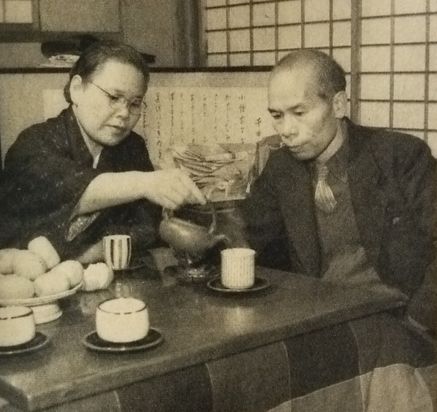Shigeji Tsuboi on:
[Wikipedia]
[Google]
[Amazon]
 was an influential
was an influential
Japan
Japan ( ja, 日本, or , and formally , ''Nihonkoku'') is an island country in East Asia. It is situated in the northwest Pacific Ocean, and is bordered on the west by the Sea of Japan, while extending from the Sea of Okhotsk in the north ...
ese poet of the modern era of Japanese literature
Japanese literature throughout most of its history has been influenced by cultural contact with neighboring Asian literatures, most notably China and its literature. Early texts were often written in pure Classical Chinese or , a Chinese-Japanes ...
. He was cofounder (with Hagiwara Kyojiro) of the Dadaist-Anarchist poetry journal ''Aka tokuro'' (Red and Black, 1923–24) and ''Bungei Kaiho'' (Literary liberation, 1927).
History
Tsuboi was born on the island of Shōdoshima and studied briefly at Waseda University in Tokyo, but he never graduated. He started as a modernist andanarchist
Anarchism is a political philosophy and movement that is skeptical of all justifications for authority and seeks to abolish the institutions it claims maintain unnecessary coercion and hierarchy, typically including, though not neces ...
, but as Marxism grew stronger in Japan, he broke up with the anarchists (which cost him a broken arm) and started to work for the proletarian movement, writing short political prose pieces and being an active organizer. He was imprisoned twice; for the second time he was imprisoned with other left-wing writers and tortured until he renounced his right to publish anti-government works. This action of the government was intended to discredit the whole movement. He went home to recuperate from his ill treatment in prison. Later Tsuboi returned from the country in despair, feeling as a traitor (he wrote about it in his poems ''Self-portrait'', ''Mask'', and ''Criminal''). He spent the whole war in Tokyo, inactive apart from forming ''Sancho kurabu'' (Sancho Panza Club), writing short humorous prose pieces with hidden anti-war messages. After the war he helped to form two magazines, ''Shin nihon bungaku'' (New Japanese literature) and ''Gendai shi'' (Contemporary poetry) and wrote one of his most popular collections of poetry, ''Fusen'' (Air-balloon, 1957). In 1962 he joined a half dozen other left-wing writers to found the journal ''Shijin kaigi'' oets' Conference dedicated to helping workers, male and female, express their dissatisfactions about the status quo.
His wife was the popular Japanese novelist .
Tsuboi's poetry includes influences from traditional Japanese forms like haiku to European movements such as anarchism, Marxism, dada and surrealism
Surrealism is a cultural movement that developed in Europe in the aftermath of World War I in which artists depicted unnerving, illogical scenes and developed techniques to allow the unconscious mind to express itself. Its aim was, according to l ...
.
Works
* ''Egg in my Palm: Selected Poetry of Tsuboi Shigeji''. Translated and compiled by Robert Epp. Stanwood, WA: Yakusha, 1993, 278 pages.References
*Novák, Miroslav, ''Ulice plná plášťů do deště'', SNKLU, Prague, 1963 {{DEFAULTSORT:Tsuboi, Shigeji 1897 births 1975 deaths Japanese activists Japanese Marxists Marxist writers 20th-century Japanese poets